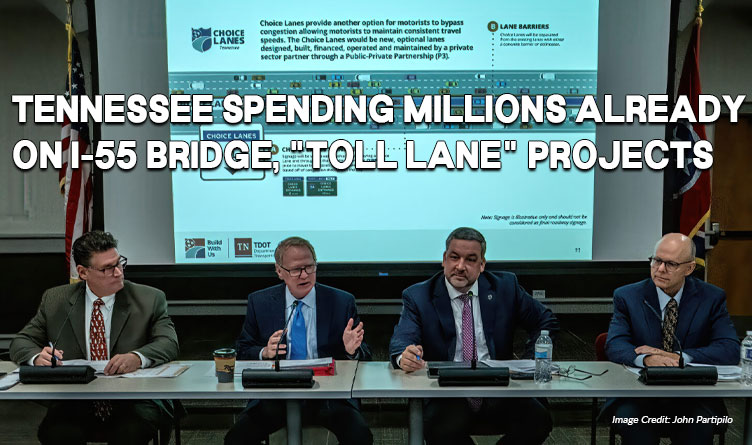Four companies hired with maximum contracts totaling $56M.
Image: Tennessee Department of Transportation Commissioner Butch Eley, second from left, unveiling the first four toll lane projects proposed by the state at a December 2023 press conference. Image Credit: John Partipilo
By Sam Stockard [Tennessee Lookout -CC BY-NC-ND 4.0] –
The Tennessee Department of Transportation hired four companies under contracts totaling a maximum of $56 million to start work on an I-55 bridge from Memphis to Arkansas and preliminary efforts on three “toll lane” corridors in the state’s urban areas, even before announcing target areas for public-private partnerships.
State officials made their plans public at a December press conference but were already well under way on this new form of road work and the bridge job. The Transportation Department hired firms through a qualification based selection process, which does not involve bids but allows the state to negotiate costs based on the scope of work. State and federal laws require a qualifications based selection process for engineering, and cost is not a factor, according to a department spokesperson.

The state tabbed national infrastructure company HNTB, which has a Nashville office, for an on-call planning contract to prepare a grant application and the environmental document for the I-55 bridge project across the Mississippi River from Memphis to Arkansas with costs and fees not to exceed $1 million, according to the Transportation Department.
For three “toll lane” projects in which the state will contract with a private contractor that will invest funds in road projects and recoup expenses through tolls, the state hired three separate consultants/advisors: HNTB for technical work in a five-year contract with a ceiling of $50 million, KPMG for financial advice with a maximum cost of $4.54 million and Hunton, Andrews, Kurth, LLP for legal work at a rate of $450 hourly for attorneys and $175 hourly for non-attorney work. All are firms that assisted other states in developing public-private partnerships, according to TDOT.

So far, the department has $12.8 million under contract with HNTB for work on technical aspects of setting up a statewide “choice lanes” program, which would enable motorists to pay fees to use designated lanes. In addition, the firm is handling traffic and revenue studies and environmental studies and documents in the Middle Tennessee region, where it has identified the I-24 corridor from Nashville to Murfreesboro and I-65 corridor from Nashville through Williamson County for likely “toll lane” projects.
Sen. Heidi Campbell, a Nashville Democrat, has criticized the program, saying local elected bodies should have a voice in the road construction projects, which could cause problems for residences and businesses.
“If the choice lane program is a financially attractive prospect for the private market, then it makes no sense not to have Tennessee taxpayers reaping the profits,” she said in a statement. “Why wouldn’t we be taking advantage of this as a source of tax revenue to invest in our anemic transit system?”
Campbell also points out KPMG has come under fire for advising Microsoft to shift profits to a small Puerto Rico factory to help it avoid billions of dollars in federal taxes, according to a ProPublica report. The U.S. government has since billed Microsoft $28.9 billion in back taxes.

In spite of criticism from Campbell and House Democratic Caucus Chairman John Ray Clemmons, the Department of Transportation is plowing ahead. The bill passed last year for a $333 million road plan received overwhelming support, including votes from Democrats, even though several Senate Republicans voted against it.
House Transportation Committee Chairman Dan Howell, R-Cleveland, said the Transportation Department is set to provide a full report Jan. 23.
“I’m aware there’s a whole lot of movement going on. That’s a whole lot of money. We’ve gotta spend it. That’s what we’re expected to do,” Howell said, noting the department has the authority to move on the preliminary work.
Transportation Commissioner Butch Eley has pointed out repeatedly the state wouldn’t be able to move forward with “choice” or “toll lane” projects that could cost a billion dollars or more because those would eat up its total budget in one fell swoop.
Working through public-private partnerships enables the state to continue with rural and suburban road projects without interruption, Eley has said.
Still, critics point out the state is targeting only about half of its road and bridge work needs.


About the Author: Sam Stockard is a veteran Tennessee reporter and editor, having written for the Daily News Journal in Murfreesboro, where he served as lead editor when the paper won an award for being the state’s best Sunday newspaper two years in a row. He has led the Capitol Hill bureau for The Daily Memphian. His awards include Best Single Editorial from the Tennessee Press Association. Follow Stockard on Twitter @StockardSam



3 Responses
Talk about rich men north of Richmond. Now they want you to buy access to the fast lane.
A few years ago Washington DC proposed to create another route into DC to relieve the congestion, but after a study by “Engineers”, one “Professors”, using Math, proved that adding the new route would not relieve the congestion.
Yes, he proved that by doubling the space for vehicles it would not relieve the space between them.
So, the plan was scrapped.
I’m sure many Companies/Politicians were disappoint that all that money wasn’t going to be in circulation so that they could “DETOUR” some of it into their accounts.
Point being, Intelligence doesn’t make most decisions, Money does.
“Point being, Intelligence doesn’t make most decisions, Money does.” Good point. Every member of the large transportation committee was given a research project covering 30 years, countries both rich and poor. It found PPPs are an “expensive and inefficient way of financing infrastrcture and services.” http://www.world-psi-org/en/publication-why-public-private-partnerships-don‘t-work.
Did anyone read or listen? No. This legislation sprang up fully formed and sailed through. Everyone wanted to jump on the guv’s bandwagon, his bill. Although technically the governor cannot write bills.. so who wrote it? Someone private? Perhaps the company that wants to invest? PPPs are part of the globalist agenda, introduced with the Clintons.
And here we are… in a few short months it went from a Nashville road, to throughout Tennessee.
Tennessee will live to regret this.